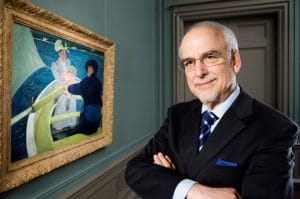An art historian specializing in the Renaissance, Cole had Master’s and doctorate degrees in art history, and taught art history at the University of Rochester from 1969 to 1973, then at Indiana University in Bloomington. That career was interrupted when, three months after the 9/11 terrorist attacks, he was tapped by President George W. Bush to Chair the National Endowment for the Humanities. Cole was unanimously confirmed by the Senate both for his original appointment, and again for his reappointment in 2005. In the context of being appointed right after 9/11, Cole said that “Defending our homeland requires not only successful military campaigns. It also depends on citizens understanding their history, their institutions, and their ideals. The humanities show us what it means to be an American, and why America’s ideals are worth fighting for.”

In a more general sense, “I see works of art as primary documents of a civilization,” he said. “The written document tells you one thing, but a painting or a sculpture or a building tells you something else. They are both primary documents, but they tell you things in different ways.” Shortly before retiring from the NEH, President Bush awarded Cole the Presidential Citizens Medal for having “inspired Americans to have a deeper commitment to the teaching, study, and understanding of American history and culture.” Cole was a Senior Fellow at the Ethics and Public Policy Center in Washington, D.C., and was appointed by President Barack Obama to the Eisenhower Memorial Commission, which is overseeing the creation of the National Dwight D. Eisenhower Memorial. Dr. Cole died from a heart attack on January 8 at his vacation house in Cancun, Mexico. He was 79.
